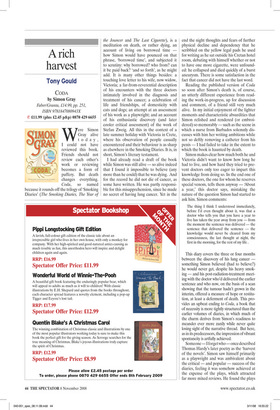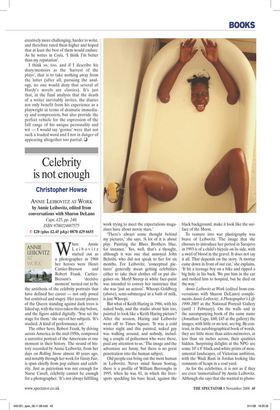A rich harvest
Tony Gould CODA
by Simon Gray Faber/Granta, £14.99, pp. 251, ISBN 9781847080943X ✆ £11.99 (plus £2.45 p&p) 0870 429 6655 Were Simon Gray alive t o d a y , I could not have reviewed this book. Friends should not review each other’s work or reviewing becomes a form of puffery. But death changes everything. Coda, so named because it rounds off the trilogy of ‘Smoking
Bokhop_e_0811.08 /11/08 11
Diaries’ (The Smoking Diaries, The Year of the Jouncer and The Last Cigarette), is a meditation on death, or rather dying, an account of living on borrowed time — how Simon would have pounced on that phrase, ‘borrowed time’, and subjected it to scrutiny: why borrowed? who from? can it be paid back? ‘and so forth’, as he might add. It is many other things besides: a touching love letter to his wife, now widow, Victoria; a far-from-reverential description of his encounters with the three doctors intimately involved in the diagnosis and treatment of his cancer; a celebration of life and friendships, of domesticity with cats and dogs; an attempt at an assessment of his work as a playwright; and an account of his enthusiastic discovery (and later cooler critical assessment) of the work of Stefan Zweig. All this in the context of a late summer holiday with Victoria in Crete, where his observation of people casually encountered and their behaviour is as sharp as elsewhere in the Smoking Diaries. It is, in short, Simon’s literary testament.
I had already read a draft of the book while Simon was still alive — so alive indeed that I found it impossible to believe (any more than he could) that he was dying. And for the record he did not die of cancer, as some have written. He was partly responsi
53 Pge 1
ble for this misapprehension, since he made no secret of having lung cancer. Yet in the end the night thoughts and fears of further physical decline and dependency that he scribbled on the yellow legal pads he used for writing as he sat outside his Cretan hotel room, debating with himself whether or not to have one more cigarette, were unfounded: he collapsed and died quickly of a burst aneurysm. There is some satisfaction in the fact that cancer did not have the last word.
Reading the published version of Coda so soon after Simon’s death is, of course, an utterly different experience from reading the work-in-progress, up for discussion and comment, of a friend still very much alive. In my initial enjoyment of the lighter moments and characteristic absurdities that Simon relished and rendered (or embroidered) so memorably — such as the scene in which a nurse from Barbados solemnly discusses with him her writing ambitions while not so deftly removing a catheter from his penis — I had failed to take in the extent to which the book is haunted by death.
Simon makes clear how much both he and Victoria didn’t want to know how long he had to live, and how hard they tried to prevent doctors only too eager to impart this knowledge from doing so. In the end one of these doctors, the one for whom he reserves special venom, tells them anyway — ‘About a year,’ this doctor says, mistaking the nature of the question Simon had started to ask him. Simon comments:
The thing I think I understood immediately, before I’d even thought about it, was that a doctor who tells you that you have a year to live has taken the year away from you — from the moment the sentence was delivered — the sentence that delivered the sentence — the knowledge would never be cleared from my consciousness, the last thought at night, the first in the morning, for the rest of my life .
This diary covers the three or four months between the discovery of his lung cancer — something Simon believed (had to believe?) he would never get, despite his heavy smoking — and his post-radiation-treatment meeting with the doctor who’d delivered the earlier sentence and who now, on the basis of a scan showing that the tumour hadn’t grown in the interim, offered a measure of hope or restitution, at least a deferment of death. This provides an upbeat ending to Coda, a book that of necessity is more tightly structured than the earlier volumes of diaries, in which much of the charm derives from Simon’s readiness to meander ever more zanily while never quite losing sight of the narrative thread. But here, as in its predecessors, the impression of vibrant spontaneity is artfully achieved.
Someone — I forget who — once described Thomas Hardy’s later poetry as the ‘harvest of the novels’. Simon saw himself primarily as a playwright and was ambivalent about the critical — and popular — success of the diaries, feeling it was somehow achieved at the expense of the plays, which attracted far more mixed reviews. He found the plays creatively more challenging, harder to write, and therefore rated them higher and hoped that at least the best of them would endure. As he writes in Coda, ‘I think I’m better than my reputation’.
I think so, too, and if I describe his diary/memoirs as the ‘harvest of the plays’, that is to take nothing away from the latter (after all, pursuing the analogy, no one would deny that several of Hardy’s novels are classics). It’s just that, in the final analysis that the death of a writer inevitably invites, the diaries not only benefit from his experience as a playwright in terms of dramatic immediacy and compression, but also provide the perfect vehicle for the expression of the full range of his unique personality and wit — I would say ‘genius’ were that not such a loaded word and I not in danger of appearing altogether too partial. q



















































































 Previous page
Previous page